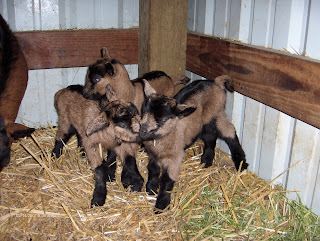"The first step to keeping goats healthy is to start with disease-free, thriving goats.... Goat buyers should ask whether the goats being purchased have been tested for any diseases and/or whether their dam has, as well. Ask about overall herd health, how the goats' health care is managed and what kinds of veterinary problems they have had. Find out the breeder's philosophy on goat care.... Ask a lot of questions."
From the Introduction, Goat Health Care
 |
| Mystic Acres Oberian Mini Dairy Goats soon to be ready for sale |
An enthusiastic newbie gets her first goats, only to have them develop abscesses, that turn out to be caseous lymphadenitis (CLA), a month later. She is irate, believing that the seller knowingly took advantage of her lack of knowledge. She asks around on some goat lists and is told that the seller should take back the diseased goats and give her money back. But there is no written agreement and this possibility hadn’t even been discussed.
Depending on the circumstances, an ethical breeder would take the goats back and refund the buyer. But if the seller refused—the buyer would likely have trouble getting her money back, would be stuck with sick and contagious goats, and might even decide that the universe is aligned against her dream of raising goats.
One way to help ensure that the goats you're getting are healthy is to have a contract that protects your rights and documents what you and the seller are agreeing to. If you just buy or sell a goat with a handshake and an oral agreement, one or both of you may think you have agreed to something you haven't.
A written contract is a legally binding agreement that can help protect both parties and prevent misunderstandings. Having a contract in writing becomes even more important when you are purchasing valuable or registered animals.
Depending on the circumstances, an ethical breeder would take the goats back and refund the buyer. But if the seller refused—the buyer would likely have trouble getting her money back, would be stuck with sick and contagious goats, and might even decide that the universe is aligned against her dream of raising goats.
One way to help ensure that the goats you're getting are healthy is to have a contract that protects your rights and documents what you and the seller are agreeing to. If you just buy or sell a goat with a handshake and an oral agreement, one or both of you may think you have agreed to something you haven't.
A written contract is a legally binding agreement that can help protect both parties and prevent misunderstandings. Having a contract in writing becomes even more important when you are purchasing valuable or registered animals.
Some sellers have contracts they are already using, but it may fall to a buyer to write the contract if she wants one. If a seller refuses to sign a contract, be suspicious. Ask why. If it's because they don't want to have to do the work, here is a link to a Goat Sales Contract written in Word, which you can tailor to your situation.
One caveat: A contract won't prevent you from getting attached to the goat(s) you purchased. I once sold a goat that I guaranteed to be fertile, only to learn later that s/he was a hermaphrodite. The buyer was already attached to the goat (and I didn't particularly want a hermaphrodite in my working herd), so I gave her the replacement and let her keep the original. Think about this and other possibilities when writing your contract.
your Compassionate~!Thanks
ReplyDeleteSales Contracts